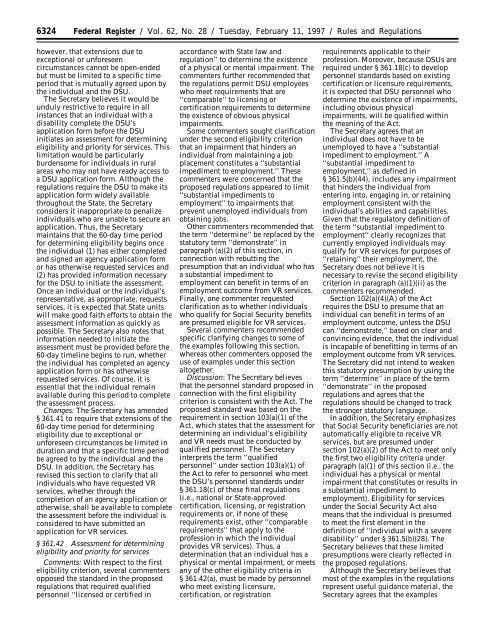federal register - U.S. Government Printing Office
federal register - U.S. Government Printing Office
federal register - U.S. Government Printing Office
Create successful ePaper yourself
Turn your PDF publications into a flip-book with our unique Google optimized e-Paper software.
6324 Federal Register / Vol. 62, No. 28 / Tuesday, February 11, 1997 / Rules and Regulationshowever, that extensions due toexceptional or unforeseencircumstances cannot be open-endedbut must be limited to a specific timeperiod that is mutually agreed upon bythe individual and the DSU.The Secretary believes it would beunduly restrictive to require in allinstances that an individual with adisability complete the DSU’sapplication form before the DSUinitiates an assessment for determiningeligibility and priority for services. Thislimitation would be particularlyburdensome for individuals in ruralareas who may not have ready access toa DSU application form. Although theregulations require the DSU to make itsapplication form widely availablethroughout the State, the Secretaryconsiders it inappropriate to penalizeindividuals who are unable to secure anapplication. Thus, the Secretarymaintains that the 60-day time periodfor determining eligibility begins oncethe individual (1) has either completedand signed an agency application formor has otherwise requested services and(2) has provided information necessaryfor the DSU to initiate the assessment.Once an individual or the individual’srepresentative, as appropriate, requestsservices, it is expected that State unitswill make good faith efforts to obtain theassessment information as quickly aspossible. The Secretary also notes thatinformation needed to initiate theassessment must be provided before the60-day timeline begins to run, whetherthe individual has completed an agencyapplication form or has otherwiserequested services. Of course, it isessential that the individual remainavailable during this period to completethe assessment process.Changes: The Secretary has amended§ 361.41 to require that extensions of the60-day time period for determiningeligibility due to exceptional orunforeseen circumstances be limited induration and that a specific time periodbe agreed to by the individual and theDSU. In addition, the Secretary hasrevised this section to clarify that allindividuals who have requested VRservices, whether through thecompletion of an agency application orotherwise, shall be available to completethe assessment before the individual isconsidered to have submitted anapplication for VR services.§ 361.42 Assessment for determiningeligibility and priority for servicesComments: With respect to the firsteligibility criterion, several commentersopposed the standard in the proposedregulations that required qualifiedpersonnel ‘‘licensed or certified inaccordance with State law andregulation’’ to determine the existenceof a physical or mental impairment. Thecommenters further recommended thatthe regulations permit DSU employeeswho meet requirements that are‘‘comparable’’ to licensing orcertification requirements to determinethe existence of obvious physicalimpairments.Some commenters sought clarificationunder the second eligibility criterionthat an impairment that hinders anindividual from maintaining a jobplacement constitutes a ‘‘substantialimpediment to employment.’’ Thesecommenters were concerned that theproposed regulations appeared to limit‘‘substantial impediments toemployment’’ to impairments thatprevent unemployed individuals fromobtaining jobs.Other commenters recommended thatthe term ‘‘determine’’ be replaced by thestatutory term ‘‘demonstrate’’ inparagraph (a)(2) of this section, inconnection with rebutting thepresumption that an individual who hasa substantial impediment toemployment can benefit in terms of anemployment outcome from VR services.Finally, one commenter requestedclarification as to whether individualswho qualify for Social Security benefitsare presumed eligible for VR services.Several commenters recommendedspecific clarifying changes to some ofthe examples following this section,whereas other commenters opposed theuse of examples under this sectionaltogether.Discussion: The Secretary believesthat the personnel standard proposed inconnection with the first eligibilitycriterion is consistent with the Act. Theproposed standard was based on therequirement in section 103(a)(1) of theAct, which states that the assessment fordetermining an individual’s eligibilityand VR needs must be conducted byqualified personnel. The Secretaryinterprets the term ‘‘qualifiedpersonnel’’ under section 103(a)(1) ofthe Act to refer to personnel who meetthe DSU’s personnel standards under§ 361.18(c) of these final regulations(i.e., national or State-approvedcertification, licensing, or registrationrequirements or, if none of theserequirements exist, other ‘‘comparablerequirements’’ that apply to theprofession in which the individualprovides VR services). Thus, adetermination that an individual has aphysical or mental impairment, or meetsany of the other eligibility criteria in§ 361.42(a), must be made by personnelwho meet existing licensure,certification, or registrationrequirements applicable to theirprofession. Moreover, because DSUs arerequired under § 361.18(c) to developpersonnel standards based on existingcertification or licensure requirements,it is expected that DSU personnel whodetermine the existence of impairments,including obvious physicalimpairments, will be qualified withinthe meaning of the Act.The Secretary agrees that anindividual does not have to beunemployed to have a ‘‘substantialimpediment to employment.’’ A‘‘substantial impediment toemployment,’’ as defined in§ 361.5(b)(44), includes any impairmentthat hinders the individual fromentering into, engaging in, or retainingemployment consistent with theindividual’s abilities and capabilities.Given that the regulatory definition ofthe term ‘‘substantial impediment toemployment’’ clearly recognizes thatcurrently employed individuals mayqualify for VR services for purposes of‘‘retaining’’ their employment, theSecretary does not believe it isnecessary to revise the second eligibilitycriterion in paragraph (a)(1)(ii) as thecommenters recommended.Section 102(a)(4)(A) of the Actrequires the DSU to presume that anindividual can benefit in terms of anemployment outcome, unless the DSUcan ‘‘demonstrate,’’ based on clear andconvincing evidence, that the individualis incapable of benefitting in terms of anemployment outcome from VR services.The Secretary did not intend to weakenthis statutory presumption by using theterm ‘‘determine’’ in place of the term‘‘demonstrate’’ in the proposedregulations and agrees that theregulations should be changed to trackthe stronger statutory language.In addition, the Secretary emphasizesthat Social Security beneficiaries are notautomatically eligible to receive VRservices, but are presumed undersection 102(a)(2) of the Act to meet onlythe first two eligibility criteria underparagraph (a)(1) of this section (i.e., theindividual has a physical or mentalimpairment that constitutes or results ina substantial impediment toemployment). Eligibility for servicesunder the Social Security Act alsomeans that the individual is presumedto meet the first element in thedefinition of ‘‘individual with a severedisability’’ under § 361.5(b)(28). TheSecretary believes that these limitedpresumptions were clearly reflected inthe proposed regulations.Although the Secretary believes thatmost of the examples in the regulationsrepresent useful guidance material, theSecretary agrees that the examples


